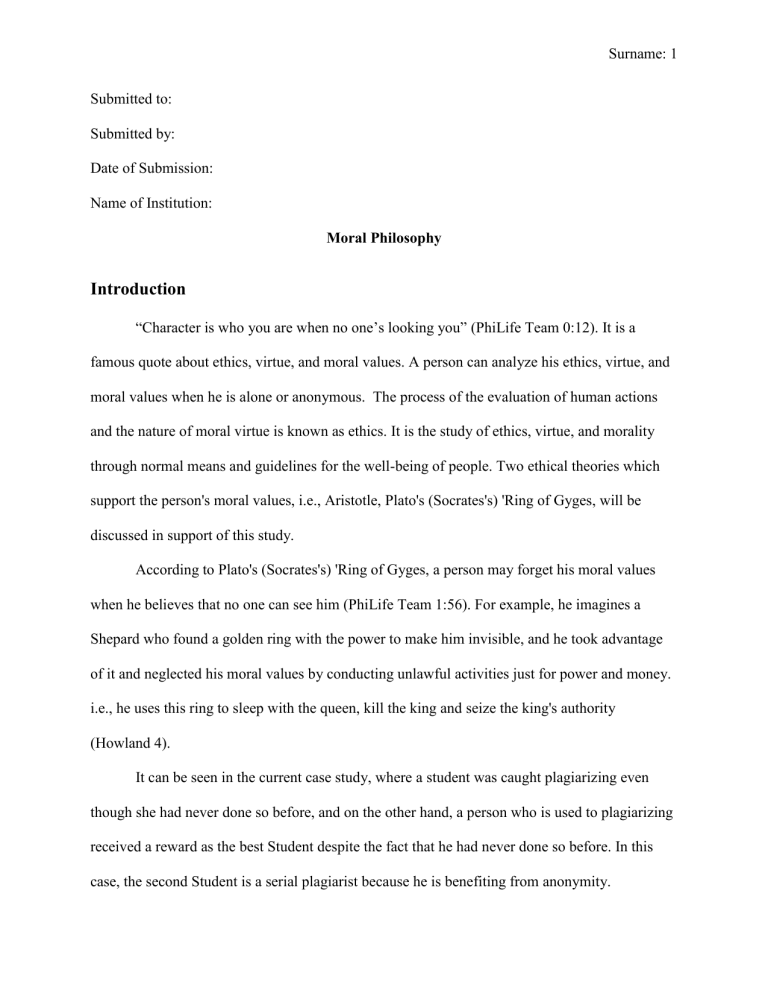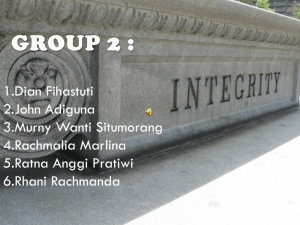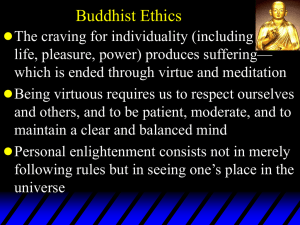
Surname: 1 Submitted to: Submitted by: Date of Submission: Name of Institution: Moral Philosophy Introduction “Character is who you are when no one’s looking you” (PhiLife Team 0:12). It is a famous quote about ethics, virtue, and moral values. A person can analyze his ethics, virtue, and moral values when he is alone or anonymous. The process of the evaluation of human actions and the nature of moral virtue is known as ethics. It is the study of ethics, virtue, and morality through normal means and guidelines for the well-being of people. Two ethical theories which support the person's moral values, i.e., Aristotle, Plato's (Socrates's) 'Ring of Gyges, will be discussed in support of this study. According to Plato's (Socrates's) 'Ring of Gyges, a person may forget his moral values when he believes that no one can see him (PhiLife Team 1:56). For example, he imagines a Shepard who found a golden ring with the power to make him invisible, and he took advantage of it and neglected his moral values by conducting unlawful activities just for power and money. i.e., he uses this ring to sleep with the queen, kill the king and seize the king's authority (Howland 4). It can be seen in the current case study, where a student was caught plagiarizing even though she had never done so before, and on the other hand, a person who is used to plagiarizing received a reward as the best Student despite the fact that he had never done so before. In this case, the second Student is a serial plagiarist because he is benefiting from anonymity. Surname: 2 On the other hand, Aristotle believes that there are two sorts of virtue: intellectual and moral virtue. Moral virtue has developed as a result of habits, experience, and minor differences in the world. In contrast, intellectual goodness is inherited from a person's birth and develops over time. Virtue is associated with the most acceptable way of life, including honesty and bravery (L. Ackrill 123). For example, in the instance of the Student mentioned above, if he applied his intellectual and moral virtues with courage and honesty, he would not become a serial plagiarist. He would be able to accomplish his work with courage and honesty. Conclusion The primary goal of that study is to critically examine the moral philosophy in light of various ethical value theories, such as Aristotle's and Plato's (Socrates') 'Ring of Gyges. This study examines these theories in the context of a case in which an innocent student was blamed as a serial plagiarist in his assignments. In contrast, other students were rewarded even though he was a plagiarist. It occurred because the serial plagiarist possessed the clock of anarchy. However, instead of imitating others, we should be honest and courageous in our work. Surname: 3 References Howland, Jacob. Plato’s Ring of Gyges and Das Leben der Anderen." Philosophy as Drama: Plato’s Thinking through Dialogue. Bloomsbury Publishing, 2019. L. Ackrill, O. Urmson. "BOOK II • MORAL VIRTUE, riot!e's Nicomachean Ethics." Ross, W. D. Moral Virtue, How Produced, in What Medium and in What Manner Exhibited. f Oxford University Press., 1980. 116-154. PhiLife Team. Why do You do the Right Thing? (The Ring of Gyges). 1 April 2019. video. 09 September 2021. <https://www.youtube.com/watch?v=Paj4GQwf8kQ>.




